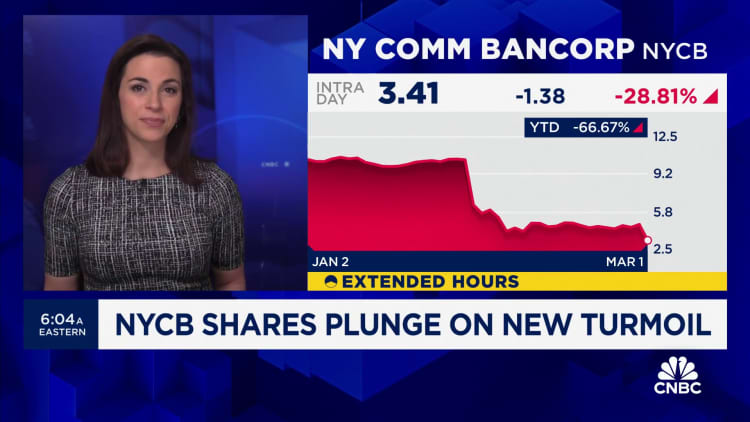A sign is pictured above a branch of the New York Community Bank in Yonkers, New York, U.S., January 31, 2024.
Mike Segar | Reuters
Regional lender New York Community Bank finds itself in an apparently worsening predicament just as the anniversary of last year’s banking turmoil nears.
Shares of the troubled lender plunged 25% on Friday to below $4 apiece after NYCB restated recent quarterly earnings lower by $2.4 billion, formally replaced its CEO and delayed the release of a key annual report.
The most worrying development, though, is directly tied to investors’ fears about commercial real estate and shortfalls the bank reported in a key aspect of its business: NYCB said that poor oversight led to “material weaknesses” in the way it reviewed its portfolio of loans.

The disclosure is a “significant concern that suggests credit costs could be higher for an extended period,” Raymond James analyst Steve Moss said Thursday in a research note. “The disclosures add to our concern about NYCB’s interest-only multi-family portfolio, which may require a long workout period unless interest rates decline.”
In a remarkable reversal of fortunes, a year after deposit runs consumed regional lenders including Silicon Valley Bank, NYCB — one of the perceived winners from that period after acquiring a chunk of the assets of Signature Bank following government seizure — is now facing existential questions of its own.
Tough quarter
The bank’s trajectory shifted suddenly a month ago after a disastrous fourth-quarter report in which it posted a surprise loss, slashed its dividend and shocked analysts with its level of loan loss provisions.
Days later, ratings agency Moody’s cut the bank’s credit ratings two notches to junk on concerns over the bank’s risk management capabilities after the departure of NYCB’s chief risk officer and chief audit executive.
At the time, some analysts were comforted by the steps NYCB took to shore up its capital, and noted that the promotion of former Flagstar CEO Alessandro DiNello to executive chairman boosted confidence in management. The bank’s stock was briefly buoyed by a flurry of insider purchases indicating executives’ confidence in the bank.
DiNello became CEO as of Thursday after his predecessor stepped down.
Deposit update?
Now, some are questioning the stability of NYCB’s deposits amid the tumult. Last month, the bank said it had $83 billion in deposits as of Feb. 5, a slight increase from year-end. Most of those deposits were insured, and it had ample resources to tap if uninsured deposits left the bank, it said.
“NYCB still has not provided an update on deposits, which we can only infer … are down,” D.A. Davidson analyst Peter Winter said Thursday in a note.
“The question is, by how much?” Winter asked. “In our view, corporate treasurers were reassessing if they are going to keep deposits at NYCB when their debt rating was downgraded to junk.”
In a statement released Friday announcing a new chief risk officer and chief audit executive, NYCB CEO DiNello noted that he had identified the weaknesses disclosed Thursday and is “taking the necessary steps to address them.” The bank’s allowance for credit losses isn’t expected to change, he added.
“The company has strong liquidity and a solid deposit base, and I am confident we will execute on our turnaround plan,” DiNello said.
Key stock level pierced
The pressure on NYCB’s operations and profitability amid elevated interest rates and a murky outlook for loan defaults has raised questions as to whether NYCB, a serial acquirer of banks until recently, will be forced to sell itself to a more stable partner.
Ben Emons, head of fixed income for NewEdge Wealth, noted that banks trading for less than $5 a share are perceived by markets as being at risk for government seizure.
A NYCB representative didn’t immediately return a request for comment.
For now, the concern seems to be limited to NYCB, where commercial real estate makes up a greater proportion of loans compared with some rivals. While NYCB stock notched a 52-week low of $3.32 per share on Friday, other bank indexes saw only slight declines.
“We expect more questions on whether NYCB will sell,” Citigroup analyst Keith Horowitz said in a note. “But we do not see a lot of potential buyers here even at this price due to the uncertainty … in our view, NYCB is on its own.”
— CNBC’s Tom Rotunno and Michael Bloom contributed to this story.
Don’t miss these stories from CNBC PRO:

